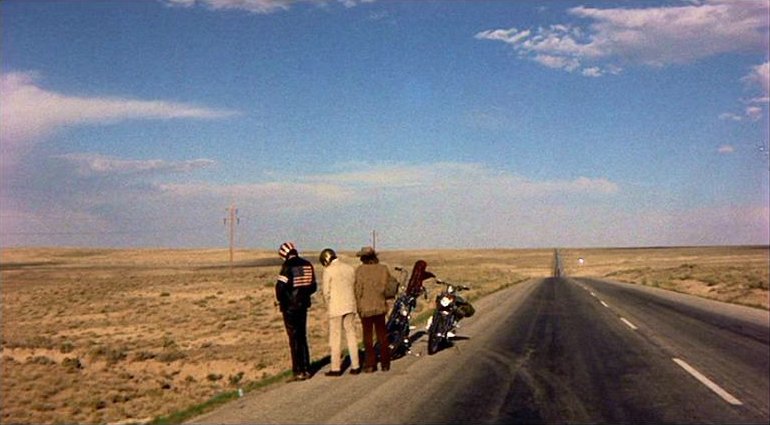As much as actor Peter Fonda and Dennis Hopper have been veterans of Hollywood and performed in countless films, for many, this is probably the film they are most associated with all the time. During the 1960s, the United States was going through a very different kind of revolution. This revolution was not just one thing, but a multitude of areas that spanned various racial backgrounds and cultures. The Civil Rights movement was a largely significant event going on during the decade. However another significant movement that also went on during this time was the "counter-culture". This movement was about the generation after the 1950s and below that was tired of the traditional "American Dream" and took matters into their own hands. This led to the idea of them "trying to find themselves". This consisted of things people didn't normally do during the time as freely - free roam traveling, drugs, adultery, etc.
 |
| "Hey man....how you doin' man?......" |
This is more or less the same idea here but portrayed in a positive light. Dennis Hopper and Peter Fonda play Billy and Wyatt respectively as two free flowing traveling bikers out to catch the upcoming Mardigras in Louisiana. On their journey they come across other encounters that show them other types of viewpoints of the time. For the screenplay co-written by Fonda, Hopper and Terry Southern (writer of Barbarella (1968)), it really is quite thin in plot but as minimal a story that it serves, it does have a great depiction of the culture at the time and how other people viewed it too. There's an array of different social statuses that are covered. That means from the rural farmland, suburb communities and even hippie towns. There, viewers will get the experience of seeing the kinds of opinions that existed out in the US when riders like these would show up.
Just because you live easy and travel around doing sight seeing doesn’t always make you look harmless. There are people who don't mind and there are people who do mind. These kinds of views are elaborated on even further by another character named George Hanson by a young Jack Nicholson. Perhaps the only written part that isn't fleshed out is Jack Nicholson's background. Hanson comes on screen after Wyatt and Billy are jailed for parading without a license and Hanson helps them get out. So how did Hanson do that? If he had the power to have Wyatt, Billy and himself released, why was he there in the first place? Obviously for plot's sake but it does feel a bit contrived if only for that reason. Nevertheless the three main actors are adequate for the roles they are cast for and their dialog although quite bereft of intelligence is understandable either way.
Yes, a lot of their dialog is reduced to including the word "man" in every sentence, but again it was apart of the culture at the time so it at least fits. Also, even though Dennis Hopper and Peter Fonda are the main leads, Jack Nicholson's performance is more lively and entertaining than theirs with his unhinged personality. However this does not mean Hopper and Fonda aren’t good. The best part about their performance is that they are not portrayed as mean spirited jerks like the wretched The Wild Angels (1966) Peter Fonda starred in prior. No, they don't follow all the rules everyday citizens do but they are at least polite to the people they meet. On a technical basis of filmmaking there is only one component that doesn't exactly work quite right and that's the editing by Donn Cambern. Occasionally the transition between scenes will flicker with the upcoming shot a couple times before it finally sticking with it. Not sure what that was all about but it was distracting.
 |
| Forget the fact these 3 are taking a wiz,....look at that sky! |
The rest however is nothing short of bad. Surprisingly for its time there is no film score to this movie. Instead, whenever Wyatt and Billy are on the road fans of the older music will hear a bunch of their favorite songs. The best and most recognizable would be "Born to Be Wild" by Steppenwolf. "Don't Bogart Me" by Fraternity of Man and "I Wasn't Born to Follow" by The Byrds are all catchy, encapsulate and ooze the 60s era with their cry-freedom lyrics and rocking guitars. The one thing audiences will be blown away most by will be László Kovács cinematography. For a film involving a story with much road riding, you'd hope there would be plenty of landscape shots and that's exactly what you'll get. There are so many great shots of the western rocky desert. It is breathtaking even when you're not physically there. It's too bad Kovács passed away, he really had a good eye.
It has some editing issues, one unexplained character back story and its plot is fairly simplistic, yet understanding the era it was made from kind of makes sense why (somewhat). It has decent acting by its main cast, the cinematography is great, and its music and accurate depiction of the culture back then makes it feel like an adequate history lesson.
Points Earned --> 7:10


No comments:
Post a Comment